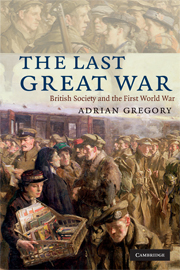Book contents
- Frontmatter
- Contents
- Illustrations
- Acknowledgements
- Introduction: The war that did not end all wars
- 1 Going to war
- 2 Defining the enemy: Atrocities and propaganda 1914–1915
- 3 From spectatorship to participation; From volunteering to compulsion 1914–1916
- 4 Economies of sacrifice
- 5 Redemption through war: Religion and the languages of sacrifice
- 6 The conditional sacrifices of labour 1915–1918
- 7 Struggling to victory 1917–1918
- 8 The last war?
- Conclusion
- Notes
- Index
6 - The conditional sacrifices of labour 1915–1918
Published online by Cambridge University Press: 05 June 2014
- Frontmatter
- Contents
- Illustrations
- Acknowledgements
- Introduction: The war that did not end all wars
- 1 Going to war
- 2 Defining the enemy: Atrocities and propaganda 1914–1915
- 3 From spectatorship to participation; From volunteering to compulsion 1914–1916
- 4 Economies of sacrifice
- 5 Redemption through war: Religion and the languages of sacrifice
- 6 The conditional sacrifices of labour 1915–1918
- 7 Struggling to victory 1917–1918
- 8 The last war?
- Conclusion
- Notes
- Index
Summary
The industrial truce and its limitations
Three years ago, the war was popular, a thing for which people were glad to make sacrifices. At present as far as I can see, it is not. I doubt one could get a hearing at a working class meeting if one spoke of the principles at stake. One would get laughed down.
R. H. Tawney, December 1917The limitations of a language of sacrifice had been neatly anticipated by the Daily Herald in the first week of the war: ‘The toilers may well be tired of sacrifices. All their life is a sacrifice.’ At the start, this newspaper, along with most of the Liberal press and much of the Conservative press was anticipating complete industrial collapse: there would be massive unemployment accompanied by shortages and inflation. August did indeed prove turbulent, but by September prices were stabilising, there were no widespread food shortages and a labour shortage in certain industries led rapidly to full employment. Although there was a good deal of criticism, the Prince of Wales Fund for the relief of distress sent a helpful signal to those suffering from economic dislocation that the middle and upper classes were not reacting with indifference to their plight. Yet even with these qualifications duly noted, the first half of the war saw a great deal of real hardship for the industrial workers. In these circumstances, the relative social peace of the first two years of the war came as a surprise.
- Type
- Chapter
- Information
- The Last Great WarBritish Society and the First World War, pp. 187 - 212Publisher: Cambridge University PressPrint publication year: 2008



